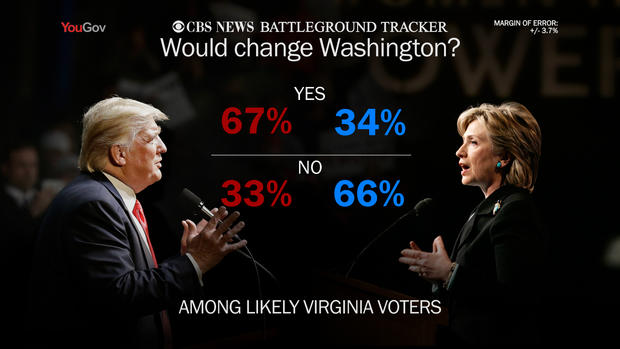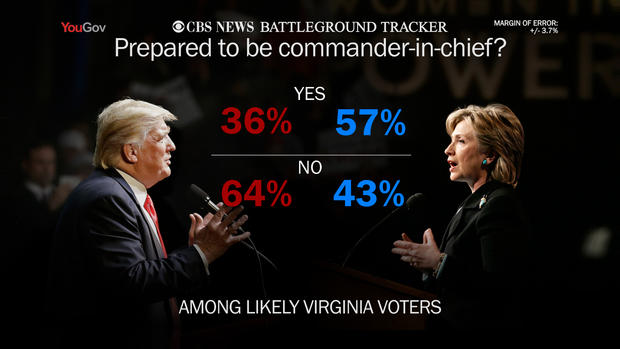2016 by the numbers: Should Donald Trump be winning?
Imagine, if you can, a parallel universe in which America is having a normal presidential election.
In this counter-historical narrative, by some metrics, the Republican candidate should be cruising to victory in November.
Polls show roughly two thirds of Americans believe the country is on the wrong track (68 percent, according to a Bloomberg Politics poll released Wednesday). The Republican candidate enjoys a wide advantage on the question of who would change business as usual in Washington, D.C., and, in some polls, a lead on handling key issues like job creation and terrorism. And to boot, the Democrats have nominated a candidate whose favorability ratings and trustworthiness, according to polls, are lower than those of any recent nominee.
Yet 2016 has been, in many ways, anything but a normal presidential election. So, despite clear public opinion hurdles, Hillary Clinton, the Democratic nominee, leads Donald Trump, the Republican nominee, by a healthy margin in most polls - even by double digits in some surveys.
The explanation is complicated, but one pattern stands out: Trump enjoys an advantage on some key "issues" questions, like who will change D.C. and who will best handle certain policy arenas, but Clinton holds a wide advantage on fundamental "attributes" questions, like who has the right temperament and the better preparation for the presidency. And thus far, polls indicate that voters are more concerned about the latter than the former.
Take, for example, the Bloomberg survey, which showed Clinton leading Trump 50 to 44 percent among likely voters nationwide. Trump bested Clinton on combating terrorism (50 to 43 percent) and creating jobs (51 to 42 percent). Voters also said he would do more to rein in Wall Street (45 to 38 percent) and change business in Washington (60 to 27 percent).
And yet Clinton was far ahead on the question of who has the right temperament to be president (56 percent said Clinton, 31 percent said Trump) and who'd be a good role model for America's children (54 percent said Clinton, 29 percent said Trump.)
Clinton's campaign has explicitly aimed to widen the gap on that last question. One of the more memorable ads from her team this cycle, entitled "Role Models," showed children watching Trump on television delivering controversial statements from the campaign trail. The text at the end of the ad tells voters, "Our children are watching. What example will we set for them?"
An NBC/Wall Street Journal poll last week, which showed Clinton ahead of Trump by nine points nationwide, 47 to 38 percent, reflected a similar pattern on issues and attributes. Trump led Clinton on dealing with the economy (46 to 42 percent) and handling crime (44 to 36 percent) - both issues that have received ample coverage this cycle. He was also far ahead on the question of who would change Washington, 48 to 26 percent. (On handling terrorism, in a departure from the Bloomberg results, the candidates were roughly tied in the NBC survey.)
But on some key attributes, Clinton held a formidable advantage over Trump. Forty-six percent of voters said Clinton would be a good commander in chief, while only 35 percent said the same of Trump. And 51 percent of voters said Clinton would be able to handle an international crisis, while only 33 percent said Trump would be able to do so. And 45 percent said they believe Clinton cares about voters like them, while only 31 percent said the same of Trump.
In swing states, the pattern holds up. The latest CBS News Battleground Tracker, released Sunday, polled voters in Virginia, Arizona, and Nevada. In all three states, voters picked Trump over Clinton when asked who would more likely enact change. But on the question of who is better prepared to be commander-in-chief, the results flipped - significantly more people voiced confidence in Clinton than Trump in all three states.
And that last result, it seems, has emerged as perhaps the single most consequential question in the election: Which candidate is better prepared to be president? In all three states, a plurality of voters cited that question as the most important consideration guiding their vote.
In Virginia, a state that in many ways closely mirrors the national electorate, two thirds of voters told CBS Clinton was not likely to bring change to Washington, while roughly the same number said Trump was likely to bring change to Washington. But while 57 percent of voters said Clinton is prepared to be commander in chief, only 36 percent said the same of Trump.
And a full 40 percent of likely voters in Virginia said their vote will come down to which candidate is more prepared for the job. Only 14 percent said shaking up the system was their top priority, and only 17 percent said improving the economy was most important.
It may be useful to think of each candidate's basic fitness for the presidency as a kind of "threshold issue" - a question voters consider before weighing more specific concerns like who would bring change, create jobs, and keep the country safe.
Voters have real reservations about Hillary Clinton on a variety of fronts, and those reservations have created liabilities and weaknesses that her Republican opponent should be able to exploit. But Donald Trump is not that opponent (at least not yet) - he's proving uniquely unable to exploit Clinton's weaknesses, because voters are more preoccupied with the basic question of whether he can do the job.
Put simply, Americans are not convinced Clinton has the right solutions or the right approach, but a majority think she's qualified to do the job. There's no such majority confidence in Donald Trump, and if he can't reverse that, any advantage he enjoys on issues and change could be a moot point.

